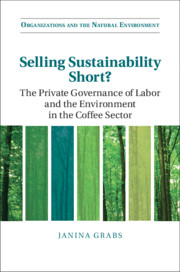 Selling Sustainability Short?
Selling Sustainability Short? Book contents
- Selling Sustainability Short?
- Organizations and the Natural Environment
- Selling Sustainability Short?
- Copyright page
- Contents
- Figures
- Tables
- Acknowledgments
- 1 Introduction
- 2 The Dilemma of Effective Private Governance
- 3 Defining the Goal of a Sustainable Coffee Sector
- 4 Changing the Market
- 5 Changing Farming Practices
- 6 Designing Effective Private Institutions
- 7 Interacting with Public Institutions
- 8 Conclusions
- Book part
- References
- Index
2 - The Dilemma of Effective Private Governance
Published online by Cambridge University Press: 28 April 2020
- Selling Sustainability Short?
- Organizations and the Natural Environment
- Selling Sustainability Short?
- Copyright page
- Contents
- Figures
- Tables
- Acknowledgments
- 1 Introduction
- 2 The Dilemma of Effective Private Governance
- 3 Defining the Goal of a Sustainable Coffee Sector
- 4 Changing the Market
- 5 Changing Farming Practices
- 6 Designing Effective Private Institutions
- 7 Interacting with Public Institutions
- 8 Conclusions
- Book part
- References
- Index
Summary
Chapter 2 constitutes the core theoretical chapter of the book. It serves two functions. First, it introduces the micro–institutional rational choice approach that is applied throughout the work. It explains why producers targeted by market-driven regulatory governance can be considered boundedly rational actors, what this characterization entails, and how institutional arrangements can help such actors to overcome collective action problems. It then shows how Kiser and Ostrom’s Three Worlds of Action can be leveraged to link institutional design choices to their outcomes. In a second step, Chapter 2 examines market-driven regulatory governance using this approach. It uncovers the institutional design dilemma that standards face as they scale up, and specifies a number of hypotheses on how these choices (e.g., between binding and flexible standard–setting; strict or flexible oversight mechanisms; and a focus on price premiums or on capacity building) will affect the implementation of standards by drawing on institutional rational choice theory as well as insights from the socio-legal literature.
Keywords
- Type
- Chapter
- Information
- Selling Sustainability Short?The Private Governance of Labor and the Environment in the Coffee Sector, pp. 41 - 73Publisher: Cambridge University PressPrint publication year: 2020
